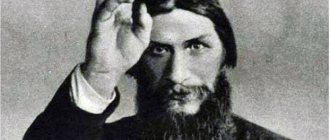No. 47 (944) / December 5 '17
Conversations with the priest
In this topic:
Conversations with the priest
Archpriest Maxim Minyailo: Through spiritual life, gain experience to improve your soul
Conversations with the priest
Archpriest John Kudryavtsev: Angelic powers
Father, this is not the first time we have met. As a priest, you have probably felt that some questions are repeated more often than others. Can you say, from your experience, which question is asked more often than others?
– People have very different questions; the most common ones relate to the sacrament of Communion: whether one should fast before Communion or not, how often to take Communion, what “worthy Communion” means and what “unworthy Communion” means. And, of course, these are questions related to the life of a Christian in the world. Everyone has an ideal of Christian life, embodied in the image of monasticism, but since a person lives in the world, he often cannot, and should not, imitate it. But most people want this, so a frequently asked question is “how to be saved in the world?” It can be asked in different forms, for example: “I rarely pray, my spiritual life is not entirely correct in one way or another - how can I tune in to it, how can I pray more often? I have lost interest in prayer." That is, questions regarding prayer and spiritual life, how to be saved in the world, are asked most often.
We have been living for almost 30 years in a country where the Church has become legal, gained freedom, and everyone can profess the faith they want. Do you think that over the years the number of superstitious questions or those related only to the ritual side has decreased? Or are there still many people who reduce religiosity only to ritual?
– I would say that such questions are not becoming less frequent. At least until you encounter them, because most of our compatriots come to the temple only when something happens. So the ritualism of the faith, which consists in the fact that a person came to the temple and lit a candle, remains with most people. Hence the questions they ask: “I dreamed of my deceased relative, what should I do?”, “I lost my cross, what will happen to me for this, and can I wear someone else’s cross?” All these questions remain, and they also have to be answered often. Perhaps this is due to the fact (although in 30 years, of course, a huge number of churches have been built, new monasteries have been built and old ones have been restored) that until recently we did not have catechesis before Baptism - when they came to church to be baptized, many were not taught, what it means to be an Orthodox Christian and what the Orthodox faith is. And now catechesis is more formal in nature. We can “catch” people who come either to be baptized themselves or to baptize their children by raising the question of long-term catechesis, at least for six months, when people purposefully study their faith, what their responsibilities as godparents are, and only then baptize . Then there would be no ritualism in faith among our people.
It often happens that frequently asked questions are heard not so much by the abbot or priest as by the candle maker. Please tell me how such interaction should take place? Let’s say a person comes and asks a candle maker a basic question, but she can’t always answer the question. How to draw a straight line between the priest, the rector, the employee and the person who simply came into the temple to light a candle?
– In some dioceses, as I know, courses are held for church workers, including those who answer certain questions. In our diocese, most churches took a different path. For example, our church of Elijah the Prophet, of which I am a cleric, was one of the first to have consultants. Since a lot of people come to the temple, there is a huge line to the candle maker, she cannot devote enough time to everyone, and this is not her task: there is a separate consultant’s table, at which there are people who have completed a course in Sunday school. The candlestick or parishioners can point to this table, where during the service there are consultants, and our parishioners who received education in Sunday school, albeit at a minimal level, are able to answer some everyday questions. They have literature that a visitor can look at, they can take him to the Sunday school building where there is a library - he can sign up and take this or that book.
That is, this is an advisory service for parishioners, or more precisely, “parishioners” who come to the temple to get an answer to this or that question. On the other hand, if this is a complex issue or it is of a spiritual nature, the consultant can take the person to the priest: the main problem is that the person does not dare to approach the priest for the first time and talk to him. Then the consultant does it for him - he brings him up, explains the situation, and the priest begins to calmly communicate with the person. I think this is a very good, correct way.
Question from a TV viewer from St. Petersburg: “I have periods when I cannot pray. Sometimes I pray for a month or two, and then I can’t pray for 3-4 days. Then I begin to pray with renewed vigor and return to normal mode. Is this normal, is it like this for everyone? Am I not offending the Lord with my weakness?”
– I think that every Christian has periods of weak prayer, everyone goes through it, and you shouldn’t be afraid of it. I always remember the story of St. Anthony the Great, who sat with his students in a clearing, they sang songs, talked about something, and smiled. Hunters came out to this clearing and were embarrassed to see that the monks were spending their time rather idlely. Approaching them, Saint Anthony said: “Can you string the bow?” - The hunters pulled. -Can you pull it even tighter? “They pulled even tighter.” - Well, what about even stronger, and even stronger? “The bow will break if we pull any longer,” said the hunters. “So is man,” answered Saint Anthony. – If it is constantly in a tense state, then sooner or later it may break.
Therefore, prayer must be replaced by some kind of doing. On the other hand, in the New Testament we hear from the apostle: pray without ceasing - he says precisely that we pray regularly.
If you notice that you leave the prayer rule for only 2-3 days, that’s one thing. But I always remember the story of Vladyka Anthony, who said that he prayed with rapture, immersed himself in prayer, he really liked it, and he told his confessor Archimandrite Afanasy (Nechaev) about this. And he generally forbade him to pray for six months or some other long period, and every evening, going to bed, to say: “Lord, with prayers...” - and remember those people who love you, pray for you, are truly dear to you. And Metropolitan Anthony says: every evening, going to bed, I remembered the people who pray for me, remember me, help me and love me - thus I felt that I was covered by their prayers. This experience was very important for him: intoxication with prayer is also a dangerous moment, there should not be such rosy, although sometimes it happens.
Therefore, what happens to your prayer, on the one hand, is natural. On the other hand, spiritual life is impossible without discipline. The manifestation of volitional efforts in spiritual life is very important. We do not always feel the closeness of the Lord, and the Lord is waiting for us to take the first step. In the first 2–3 years after Baptism, when the gift of faith is given, the so-called calling grace occurs, and the person is inspired. Little by little this gift is taken away, and the person himself must take the first steps, just as a mother first leads the child, holding him with both hands, and then the hands are taken away - and he must take the first steps himself. It's really quite difficult; he has to make some effort. It’s the same in spiritual life: the Lord gave man to hold on to His robe, and he felt the grace of being with the Lord, which will support him throughout his life.
It is no coincidence that in the Gospel, after the Resurrection, the Lord tells the disciples to go to Galilee: their first meeting took place there on Lake Galilee, and they must return there to relive these feelings. In the same way, a Christian, when the feeling of the closeness of Christ leaves him, returns to the first years of his faith and entry into the Church in order to re-experience the feeling of being close to Christ and to take these steps independently.
Question from a TV viewer from Bobruisk: “They say that mother’s prayer lasts from the day of the sea. My daughter lives in Finland with my ex-first wife, I don’t know anything about her, how she is. Does a father's prayer have power? I don’t know whether I should pray for her health or for her peace. Now she is 28 years old, I don’t know if she is alive or if she has children. Does my prayer have any power from the Lord? I wish I could get some kind of sign from her.”
– We always cite the beginning of a good Russian proverb that a mother’s prayer will reach you from the bottom of the sea, but it also has a continuation: but a father’s prayer does not allow you to fall there. Of course, father's prayer is very important. In general, the prayer of the father, as the ancestor, the head of the family, is very important and is not related to distance. After all, spiritual life and blessings have no distance; blessings can be taught from anywhere in the world, even if people are separated by a huge distance. The father's blessing and prayer are not hindered by distance. Maybe your daughter's life will be more successful because you pray.
I remember when we entered the first class of the seminary, a very honorable teacher, now deceased, Igor Tsesarevich came to us and told us: “After 70 years of godlessness, it is a miracle of God that you are within the walls of theological schools. Apparently, there was some kind of prayer book in your family who begged you.” And he also said: “We all live for someone’s sake.” We need to understand for whom we live. Apparently, there was a prayer book in the family, thanks to which the hearts of a person from an atheistic or secular family, completely non-church due to the 70th anniversary of atheism, were suddenly touched by the Lord. And he not only touched, but also brought him to theological schools, and he became a clergyman, although 2-3 years ago he could not even imagine that he would sit at a seminary desk: the prayer of his great-grandfather and great-grandmother has come true now... Therefore, it is a very important point that you pray for your daughter. It doesn’t matter what kind of relationship you have, how far you are from each other, this is your immediate responsibility as a father. Remember also that your prayer imposes a blessing on your entire family and on the family of your daughter.
Let me ask you a question that came to us through a group on the VKontakte social network. Our TV viewer asks: “Please tell me, what should a Sunday school teacher be like? What moral, spiritual and other qualities should he have? And what is the responsibility of a Sunday school teacher to the Lord, the children and the community?”
– Sunday school teachers should be different, but the most important thing, it seems to me (this is my opinion), is that a Sunday school teacher should be an interesting person. Morally, he must be a good, pious Christian who regularly receives the Holy Mysteries of Christ, so that the children regularly see him at services. And from a teaching point of view, I think, first of all, it should be interesting: Sunday school is not cramming or studying at a desk. A child has already spent 5-6 days at a desk, but not everyone is ready to sit at a desk for another 7 days and listen to a Sunday school teacher talk about the Gospel. This is an additional burden on the child.
Consequently, these are “optional” (I say in quotes) activities that are additionally offered to the child by his parents. Nowadays, most often I encounter parents asking their children (which is correct) if the child wants to go to Sunday school. It is clear that at the age of 7 a child can already answer whether he has a desire to attend Sunday school. Although sometimes parents completely forget to ask their children if they want to attend Sunday school. In my opinion, it would be correct to ask a child whether he wants to go to Sunday school: if the child has motivation - he wants to - this is the most important thing. Or, in the first 2-3 lessons, the teacher should create a desire in the child to come to these classes.
There are many forms of work in Sunday school. These include excursion trips and trips to the nearest temples in the area. These could be activities related to creativity. Now there are so-called pedagogical workshops, based on the experience of Tolstoy, Rousseau, and many other famous teachers, which allow children to be in an active form by asking questions and searching for answers to them. Children themselves are involved in finding the answer to a particular question. For example, the Lord is the Almighty, but how was it manifested that He is the Almighty, where in the Holy Scriptures are these places found? Or what does the term “Almighty” even mean? The teacher can offer them dictionaries, encyclopedias, “Symphonies” for the Bible, where certain words are selected, so that at the end of the lesson the children themselves formulate the definition of the Lord as the Almighty, having carried out a little research work. When children are more involved, it ceases to be a monotonous lesson, but becomes an encounter, and the teacher becomes a friend to them. But here again it is important that this is not familiarity, as this can lead to problems and to the fact that teachers will no longer be receptive. You just need to be a good friend-mentor, then the lessons will go differently. For a child, this is, of course, a burden: children study at school, where they have a heavy workload, plus clubs, electives, music school... And another burden appears - Sunday school. We must make the child want to come to Sunday school, and this depends on the teacher.
We must remember that the teacher, like the priest, imparts to children the basics of faith. And discussions about faith are very, very important. I teach at a secular school and I’m always happy when children come and say that they read the children’s Bible, or start singing a carol that they learned in music school - it means that they like it, they responded to something, that’s always a plus . Therefore, I would not focus on the form of a regular Sunday school lecture - but this is my opinion.
Teachers may be different, but the most important thing is, of course, the personality of the teacher the child meets. Therefore, priests and rectors of churches carefully approach the choice of a teacher for Sunday school, and not as it happened before: Maria Ivanovna is our teacher, so she will teach. And Maria Ivanovna, perhaps, is completely unprepared to teach legal disciplines - this is a teaching activity of a special kind, here the approaches of a regular school do not always allow a child to grow up as a believer. Helping a child have an encounter with Christ is the basis of the work of any teacher. And, of course, a teacher must pray for his students: if a teacher does not pray for his students, especially in Sunday school, then what kind of teacher is he? He should have a list, and at services he should pray for his students. He must submit notes about his students.
The teacher must understand the problems of his student’s family: why Vasya came sad today, why he behaves this way and not otherwise. This is an important point. If we are talking about the ages of 7–11 years, then the children tell it themselves. I had a rather scary experience when a child came and said: today my mom and I ran down the street from dad all night. As I understand it, dad came drunk and started chasing them around the house throughout the night. I understand why my child doesn’t sit in my lesson: he spent the whole night incomprehensibly. A Sunday school teacher must understand that families are different. There are single-parent families when a single mother brings a child to Sunday school, and for such a child it is important that the teacher, if he is a man, becomes a model of a man for him. That is, a lot depends on the teacher.
Father Konstantin, we have the field of Nativity Lent ahead of us. Probably the most common questions that come to the priest when Lent begins are gastronomic questions. What place do you think they should occupy in spiritual life?
– Fasting has two wings: one concerns restrictions on fast food, that is, food of animal origin. The second wing is prayer and some kind of spiritual work. I think one should not prevail over the other: very often we respect the external form without filling it with internal content. First of all, I think that during Lent we need to increase our prayer rule, read the Holy Scriptures more, let us read at least four Gospels during Lent: it is quite possible to read one Gospel in a week, and since Lent is forty days, it turns out that even more than in a week. This is what we should impose on ourselves during fasting. Because in our country, as I often say, fasting is a doctor’s recommendations, supported by the priest’s blessing. Everyone comes and says: you know, the doctor told me that I have this and that, so I can’t do this and that, bless me for this. Indeed, to a large extent, our fasting is the doctor’s recommendations, which the priest confirms with his blessing. Therefore, physical fasting is based on the capabilities of one’s physical strength.
On the other hand, no one has canceled spiritual fasting; no doctors’ recommendations are considered here. Therefore, I believe that, first of all, a person should pay attention to spiritual work. If he has lost the regularity of prayer, then this is just a good time to resume regular prayer work - morning and evening. If a person has stopped reading the Holy Scriptures, then this is a good time to start reading them regularly again. If a person has stopped visiting the temple regularly, then this is the right time to start visiting it regularly again.
We understand that food, to one degree or another, affects our state, including our psychological state: if we eat meat, we become relaxed, if we don’t eat meat, we are more collected, and so on. We feel that the body somehow reacts to what we consume, including on a spiritual level. Therefore, food restriction refers specifically to this category.
Recorded by: Ksenia Sosnovskaya
You can view or listen to the full version of the program on the website of the Soyuz TV channel.
In other rooms:
How to contact a priest
Of course, priests do not expect all parishioners to have a good knowledge of the church rules of conversion, and no one will scold you if you convert incorrectly. But it’s still worth familiarizing yourself with the basic rules of decency. How to address a clergyman at a meeting?
In Russian tradition, the address “father” is accepted. Calling a priest “father” is also allowed, but this address is more suitable for older parishioners. If you know the spiritual name of the priest, then use it: “Father (name).”
Type of questions
Questions, as you know, are different. Questions that are asked to priests are divided into:
- Everyday questions (for example, is it possible to buy a car, what university to enroll in, is it possible to get married now and to whom, etc.). As a rule, such questions do not require a priest to answer. You can solve them yourself. Of course, in spiritual books it is often written that for every event in life one must ask the permission and opinion of a priest. But these books were written at a time when there were plenty of priests, and each believer had a personal confessor. But now there is a catastrophic shortage of priests, one priest has two or three parishes in his department, and his time is limited, the day is calculated by the minute. In fact, these questions should only be asked to confessors , if there are any.
- Required questions (when can you bring a child to the sacrament of baptism , on what day can you bless a car or house, when can you perform a funeral service for a deceased person, give communion to a sick person , etc.). It is better to contact the church shop with such questions, rather than taking up the priest’s precious time.
- Spiritual questions (is it possible for a specific person to break fast due to illness, how long to read the prayer rule, is it possible to pray the rosary, is it possible to read the book “Philokalia”, is it possible to believe dreams and premonitions, etc.). These questions can and should be asked to priests, but it is better, again, to the confessor or the priest who knows this person well. Because any task, especially prayer, must be approached responsibly. It often happens that an incorrectly chosen rule harms a person’s soul and threatens with serious consequences, such as: spiritual delusion or overwork, breakdown. For any prayer rule, reading the psalter, praying the rosary, etc. you need to take a special blessing .
- Questions regarding this temple (blessing to sing in the choir, desire to donate something to the temple, etc.). These questions should be asked to the rector of the temple.
After sifting out questions by type, you need to think about the time when it is appropriate to ask them to the priest.











